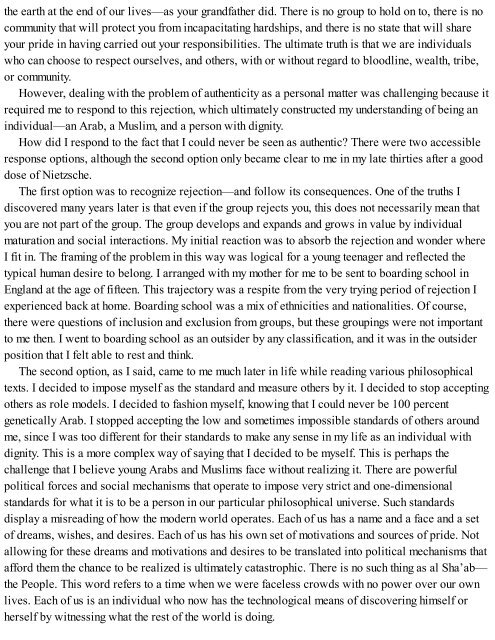1250119847
You also want an ePaper? Increase the reach of your titles
YUMPU automatically turns print PDFs into web optimized ePapers that Google loves.
the earth at the end of our lives—as your grandfather did. There is no group to hold on to, there is no<br />
community that will protect you from incapacitating hardships, and there is no state that will share<br />
your pride in having carried out your responsibilities. The ultimate truth is that we are individuals<br />
who can choose to respect ourselves, and others, with or without regard to bloodline, wealth, tribe,<br />
or community.<br />
However, dealing with the problem of authenticity as a personal matter was challenging because it<br />
required me to respond to this rejection, which ultimately constructed my understanding of being an<br />
individual—an Arab, a Muslim, and a person with dignity.<br />
How did I respond to the fact that I could never be seen as authentic? There were two accessible<br />
response options, although the second option only became clear to me in my late thirties after a good<br />
dose of Nietzsche.<br />
The first option was to recognize rejection—and follow its consequences. One of the truths I<br />
discovered many years later is that even if the group rejects you, this does not necessarily mean that<br />
you are not part of the group. The group develops and expands and grows in value by individual<br />
maturation and social interactions. My initial reaction was to absorb the rejection and wonder where<br />
I fit in. The framing of the problem in this way was logical for a young teenager and reflected the<br />
typical human desire to belong. I arranged with my mother for me to be sent to boarding school in<br />
England at the age of fifteen. This trajectory was a respite from the very trying period of rejection I<br />
experienced back at home. Boarding school was a mix of ethnicities and nationalities. Of course,<br />
there were questions of inclusion and exclusion from groups, but these groupings were not important<br />
to me then. I went to boarding school as an outsider by any classification, and it was in the outsider<br />
position that I felt able to rest and think.<br />
The second option, as I said, came to me much later in life while reading various philosophical<br />
texts. I decided to impose myself as the standard and measure others by it. I decided to stop accepting<br />
others as role models. I decided to fashion myself, knowing that I could never be 100 percent<br />
genetically Arab. I stopped accepting the low and sometimes impossible standards of others around<br />
me, since I was too different for their standards to make any sense in my life as an individual with<br />
dignity. This is a more complex way of saying that I decided to be myself. This is perhaps the<br />
challenge that I believe young Arabs and Muslims face without realizing it. There are powerful<br />
political forces and social mechanisms that operate to impose very strict and one-dimensional<br />
standards for what it is to be a person in our particular philosophical universe. Such standards<br />
display a misreading of how the modern world operates. Each of us has a name and a face and a set<br />
of dreams, wishes, and desires. Each of us has his own set of motivations and sources of pride. Not<br />
allowing for these dreams and motivations and desires to be translated into political mechanisms that<br />
afford them the chance to be realized is ultimately catastrophic. There is no such thing as al Sha’ab—<br />
the People. This word refers to a time when we were faceless crowds with no power over our own<br />
lives. Each of us is an individual who now has the technological means of discovering himself or<br />
herself by witnessing what the rest of the world is doing.
















